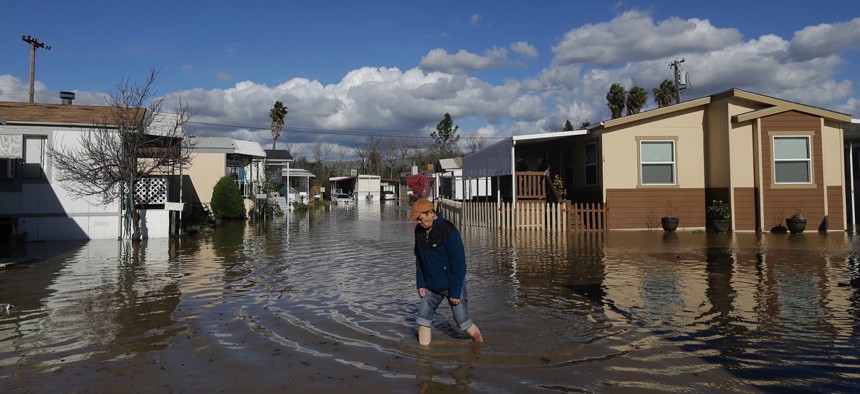Connecting state and local government leaders
A consumer advocacy group said regulators are also to blame for the delay in getting service back up. Wireless carriers countered that they’ve restored service as quickly as possible.
Wireless service remains spotty in the areas of the Florida panhandle that were hit hardest by Hurricane Michael a week ago, with officials saying storm victims have struggled to find out about emergency assistance because of the communications breakdown.
In Bay County, where Panama City and Mexico Beach are located, 47 percent of cell sites were down as of Thursday according to a Federal Communications Commission’s status report.
Calling the “slow progress” of restoration “unacceptable,” FCC Chairman Ajit Pai joined Florida Gov. Rick Scott this week in urging wireless carriers to waive the the October bills of affected residents and allow them to switch providers without penalty.
Scott noted that the outages have made it difficult for people to get in touch with family members or find out about the available aid, while also hampering the ability of first responders to talk to each other.
Pai further directed the FCC’s Public Safety & Homeland Security Bureau to investigate the delay and plans to visit the panhandle on Friday.
“I hope to see that wireless coverage in the area near where the hurricane made landfall is being restored more quickly than was the case earlier this week,” Pai said in a Wednesday statement.
The service restoration has progressed more rapidly in Georgia, with just four cell sites reported down on Thursday. In contrast, 205 sites in the entire Florida panhandle were down as of Thursday morning, with 112,402 subscribers without service.
More than 2,000 personnel are working to restore communications, according to Scott’s office, and Verizon reported Tuesday that 98 percent of its Florida customers have service. Verizon is offering three months of free monthly access to customers in the nine hardest-hit counties.
“The biggest challenges have been in the Panama City/Panama City Beach area,” said spokeswoman Kenzee Najuma Thorpe. “Despite triple redundancy, we had unprecedented damage to our fiber.”
Before Michael hit on Oct. 10, AT&T began issuing credits to customers in the affected counties of Bay, Calhoun, Franklin, Gulf, Liberty, Taylor, and Wakulla with plans to extend them through Oct. 21.
AT&T also deployed 15 portable cell sites to the most storm-damaged areas to provide first responders with connectivity.
“Overall our networks performed well during Hurricane Michael,” spokeswoman Rosie Montalvo told Route Fifty by email. “Today, we are fully restored in affected areas in Georgia and we continue to address the few remaining parts of our network in north Florida that were affected by the storm.”
Sprint is similarly providing bill credits, and T-Mobile reports 99 percent of its panhandle cell sites are up.
None of the four carriers that responded commented on the possibility of customers switching providers for free.
While Pai called for the investigation of wireless carriers, public interest group Public Knowledge criticized the FCC chair for repealing Obama-era safeguards in the last two years designed to prevent large-scale, long-term communications blackouts like those that occured in the wake of 2012’s Superstorm Sandy.
The FCC did not respond to a request for comment about that criticism.
On Sept. 26, Public Knowledge filed a lawsuit against the FCC in federal court for violating the Communications Act and Administrative Procedure Act in its failure to uphold its “core statutory values” of consumer protection, competition and public safety, according to court records.
In a 2017 rulemaking, the agency eliminated a requirement for carriers to maintain their networks and created an accelerated discontinuance process allowing them to end service in a given area. Proponents argued the move would increase broadband investment.
Particularly in rural areas, where carriers get poor return on investment, they “were essentially letting the networks rot,” Harold Feld, senior vice president at Public Knowledge, told Route Fifty.
When a natural disaster downs fiber or copper lines in rural areas, there’s now less incentive to repair and more to discontinue service. Providers are reluctant to spend money on emergency preparedness and typically underestimate their needs when they do, Feld added.
He said states like Florida have added to the deregulation. Under Scott, the state passed the Regulatory Reform Act of 2011 eliminating “virtually all oversight of Florida’s residential telephone service,” Feld said. Rules requiring carriers to provide service to everyone in the state and restore service in a timely fashion were eliminated.
Scott’s office did not respond to a request for comment.
“We have pushed on the FCC since Superstorm Sandy to take the necessary steps to ensure carrier networks … are sufficiently robust and reliable and repaired in a reasonable amount of time after a disaster,” Feld said. “When you’re coming in now telling people they have to do stuff, because the cameras are on and you look bad, it’s too late.”
Dave Nyczepir is a News Editor at Government Executive’s Route Fifty and is based in Washington, D.C.

NEXT STORY: Nevada and Arizona Ballot Measures Would Require Utilities to Use More Renewable Energy Sources




